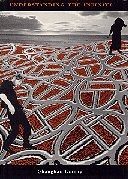How is it that we can feel some understanding of infinity, even when we cannot possibly have any real experience of it? Lavine explores this question by examining the mathematics of set theory and the infinite, and showing that our understanding could arise as an extrapolation of the properties of 'indefinitely large' quantities.
Shaughan Lavine is a philosopher and mathematician, and he pulls no punches in this treatise. As a specialist in neither of those disciplines, I found this a difficult read, and I am sure I have not appreciated all the points he is making. Nevertheless, I found the effort rewarding.
He starts by giving an historical overview of the development of Cantor's set theory, and why it may be unfair to call it 'naive': Russell's paradoxes require a predicative definition of sets [the inclusion of an element being determined by whether it satisfies some predicate], whereas Cantor defined his sets combinatorically, and so the paradoxes did not arise.
He then goes on to discuss the notion of finite, and how various different models of finiteness can be constructed, but how we have an independent notion of what is 'really' finite:
He continues by saying that a good philosophy of mathematics must capture the way mathematicians really do their mathematics, and so must capture why some concepts seem intuitive:
Next he argues that the Axiom of Choice is contentious only for predicatively defined sets, not for combinatorically defined ones. He discusses the axiomatisation of modern set theory, and how it is rather a hodge-podge of historical accidents.
Finally, he proposes a way of deriving the notion of infinite by giving a means of extrapolating from the mathematics of the "indefinitely large" [numbers that are finite, but nevertheless large enough that we never "run out" of them, whatever calculations we actually perform]. His aim is to help mathematicians to develop new axioms of set theory, such as that needed to assert or deny the Continuum Hypothesis:
Although he does recover all the axioms of set theory from this approach, unfortunately (but perhaps not surprisingly) he does not discuss any new axioms.
I must confess I did skip some parts when they got too technical for me, but I do feel that I now understand the infinite, if nowhere near completely, then at least better than I did before I started reading.
